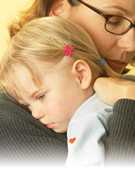Content on this page was developed during the 2009-2010 H1N1 pandemic and has not been updated.
- The H1N1 virus that caused that pandemic is now a regular human flu virus and continues to circulate seasonally worldwide.
- The English language content on this website is being archived for historic and reference purposes only.
- For current, updated information on seasonal flu, including information about H1N1, see the CDC Seasonal Flu website.
When to Get Medical Help for Fluid Loss
December 5, 2009, 6:00 AM ET
While anyone can become dehydrated, infants, children, and older adults are at greatest risk of getting dehydrated. Also, pregnant women will want to make sure they are getting enough fluids.
When To Call The Doctor To Ask For Advice
Call right away if you or your child has any of these symptoms of dehydration:
Signs Of Dehydration In Infants And Toddlers:
- Sunken soft spot on top of your infant’s head
- Diarrhea or vomiting in infants 2 months or younger
- The baby seems much less active or more irritable than normal
- Fewer tears when crying or not making tears
Signs Of Dehydration In children And Adults:
- Not making tears
- Less than normal amount of urine. In babies you may see fewer wet diapers or diapers that weigh less than normal
- Skin that is dry and takes long to go back to position when pinched
- Dry mouth or dry eyes
- Fast-beating heart
- Blood in the stool or blood in vomit
- The child has had a fever for 12 or more hours and also is not able to drink fluids, throwing up or having diarrhea
- The child may be cranky or irritable, hard to wakeup, have little energy, appear “rag doll weak”
Get email updates
To receive weekly email updates about this site, enter your email address:
Contact Us:
- Centers for Disease Control and Prevention
1600 Clifton Rd
Atlanta, GA 30333 - 800-CDC-INFO
(800-232-4636)
TTY: (888) 232-6348 - Contact CDC-INFO


